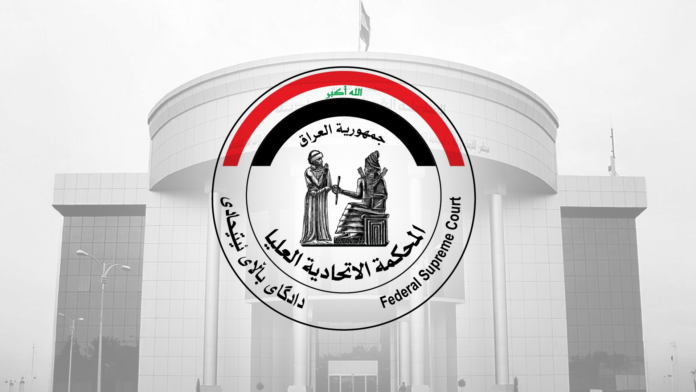Iraq has witnessed a new wave of political and legal controversy after the Federal Supreme Court issued a preliminary injunction to suspend three controversial laws: the General Amnesty Law, the Personal Status Law, and the Property Restitution Law. The decision was made due to concerns about the legitimacy of voting on these laws. This ruling has sparked mixed reactions among political and legal factions, reigniting debates over the constitutional powers of the Federal Court and the Supreme Judicial Council.
Tensions between the Supreme Judicial Council and the Federal Supreme Court have escalated over the concept of preliminary injunctions and the authority of each institution to issue them. The Supreme Judicial Council has introduced a new interpretation of “rulings” and “preliminary injunctions,” stating that while such injunctions fall within the jurisdiction of the Federal Supreme Court, they remain subject to appeal under the Civil Procedure Law.
In contrast, the Federal Supreme Court insists that its rulings, including preliminary injunctions, are binding and final, emphasizing that the Constitution grants the court full enforcement authority.
Deputy Chief Justice of the Federal Court of Cassation, Judge Hassan Fouad, clarified that preliminary injunctions do not fall within the jurisdiction of the Federal Supreme Court but remain under the jurisdiction of ordinary courts, as stipulated in the Civil Procedure Law. He also pointed out that Article 94 of the Iraqi Constitution states that the Federal Supreme Court’s rulings are final and binding on all authorities. Still, he emphasized that preliminary injunctions do not affect the substantive rights of a case and remain subject to appeal.
According to Article 151 of the Civil Procedure Law, a preliminary injunction is a temporary administrative measure issued by a competent judge at the request of one party in urgent cases. Its purpose is to protect rights and public freedoms until a final ruling is reached.
Article 300 of the same law further states that a preliminary injunction is immediately enforceable and suspends the execution of all related decisions and procedures until the case is resolved.
On January 21, the Iraqi Parliament passed laws that sparked widespread division, most notably the Personal Status Law, which faced strong opposition from human rights activists and women’s organizations.
This law was met with sharp criticism due to concerns that it could allow child marriage and deprive women of financial rights and custody. Some Shiite parties defended it, claiming that it upholds freedom of belief, while others argued that it threatens women’s and children’s rights.
The General Amnesty Law was another controversial measure, as Sunni parties pushed for its passage as a precondition for forming the current government, seeking the release of detainees from western and northern Iraq. However, critics warned that the law might also apply to individuals convicted of corruption, particularly those involved in what became known as the “heist of the century.”
The Property Restitution Law also faced intense opposition from political factions that feared it could lead to an unjust redistribution of public and private property.
The Federal Supreme Court’s decision to suspend these laws prompted significant political reactions. Jamal Al-Dari, Secretary-General of the Iraqi National Project, called for an emergency meeting of political leaders, warning that involving the judiciary in political disputes could lead to further crises.
Former Parliament Speaker Mohammed Al-Halbousi accused the court of politicizing its rulings and called for mass protests against what he described as an unconstitutional intervention in legislative affairs.
Meanwhile, the governors of Salah al-Din, Anbar, and Nineveh announced an official suspension of work in protest against the court’s ruling. At the same time, the Council of Muslim Scholars in Fallujah called for a unified Friday prayer to express their opposition.
In defence of the court, MP Jawad Al-Yassari asserted that the Federal Supreme Court’s rulings are final and must be implemented, emphasizing that it is an independent judicial body that does not favour any political party.
On the other hand, MP Mahma Khalil viewed the court’s use of preliminary injunctions as a precautionary measure to prevent the laws from taking effect before proper investigations are concluded.
The controversy has sparked broader discussions about the balance of power between the judiciary and the legislature and the future of governance in Iraq.
The Federal Supreme Court maintains that its decisions are binding, raising questions about how other authorities will comply with its rulings, particularly amid ongoing political tensions.
Iraq appears to be entering a new phase of institutional conflict as the Federal Supreme Court seeks to assert its constitutional power against challenges from the Supreme Judicial Council and Parliament. As legal and political disputes over the legitimacy of these laws persist, the key question remains: Will Iraq’s political forces find a resolution to this crisis, or is the country headed for a new wave of constitutional turmoil?
Law is not merely rigid text; it is the scale that preserves a nation’s stability. The question now is: Will this scale remain balanced in Iraq?




